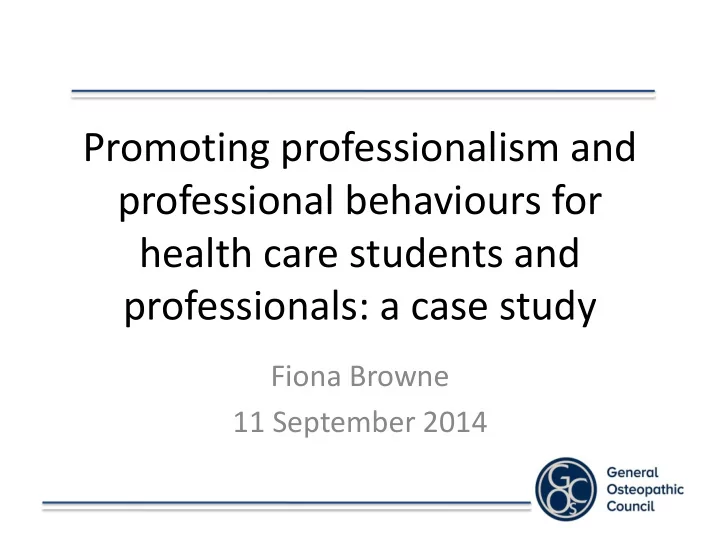

Promoting professionalism and professional behaviours for health care students and professionals: a case study Fiona Browne 11 September 2014
Professionalism: a partnership Professionals must: Regulator • put patients first and involve Employer them in their treatment and Team care Osteopath • be accountable and transparent • exercise professional judgement • keep up to date in their chosen field • act if care or safety is compromised
Methods Working in partnership with educational institutions we: • Adapted and field-tested situational judgement scenarios for students and facilitated discussions to support learning • Developed and piloted e-learning tools for registrants with automated feedback • Analysed data between cohorts, stakeholders and professions to begin to evaluate risk and reduce harm to patients
Academic integrity Q: Altering or manipulating data, e.g. to obtain a significant result? What sanction is appropriate for a first time offence? • 1 = None • 2 / 3 = Reprimand (verbal or written warning) • 4 / 5 = Reprimand plus mandatory counselling • 6 = Failure of specific class • 7 = Failure of specific year • 8 = Expulsion (readmission possible) • 9 = Expulsion (no readmission) • 10 = Report to professional body
Altering or manipulating data • Educational institution median response = 5 • Osteopathic student median response = 5 • Medical student median response = 4 (Roff) 4/5 = Reprimand plus mandatory counselling 6 = Failure of specific class • Patients = repeating the examinations/essays/projects (Brockbank) • Doctors = repeating the examinations/essays/projects (Brockbank) See Brockbank, 2011 and Roff, 2012
Comparisons with others Responses from Responses from osteopathic medical students See Roff, 2012 students 25 of 30 situational judgement Equivalent Equivalent scenarios Examining patients without the 4 2 knowledge or consent of a supervising clinician Threatening or verbally abusing a 5 8 university or college employee or fellow student Falsifying references or grades on a 8 6 curriculum vitae or altering grades on an official record
Clinical questions Q: A student falsifies audit or research data in collection of analysis/reporting a. Is this wrong 1 = not very 2 3 4 5 = very wrong wrong b. If another student becomes aware of this behaviour/attitude, should they in the first instance : Ignore it Challenge Discuss with Report to a Other? peers senior
Falsify audit/research data Is this wrong? What action? 14 10 9 8 12 7 6 10 Patients Patients 5 4 8 3 Students - Students - 2 6 1 yr 3 yr 3 0 Students - Students - 4 yr 4 y4 2 0 1 2 3 4 5
Social media friendship (patient) 18 16 14 12 10 Patients 8 Students 6 4 2 0 Ignore it Challenge the Discuss with Report to more person peers senior person
E-learning and feedback for registrants • Situational judgement scenario • How professional? • Osteopathic Practice Standards • Guidance • Feedback • How professional?
GOsC emerging conclusions • E-learning and collecting data from osteopaths and other health professionals can help to bring norms together across professions and professional groups through feedback, dialogue and reflective learning • Working in partnership with individuals and organisations can help us to develop strategies to support co-ordinated approaches to implementation of guidance and lapses in professional norms, behaviour and standards • This requires a more active approach to regulation than has to date existed
Acknowledgements and references • Browne F. et al, (2014), Adapting and feasibility testing pre-registration e-learning resources for Professionalism in Osteopathy in the UK , International Journal of Osteopathic Medicine • Roff S et al, (2012) Medical student rankings of proposed sanctions for unprofessional behaviours relating to academic integrity , Scottish Medical Journal • Roff S and Dherwani K, (2011), Development of inventory for polyprofessionalism lapses at the proto-professional stage of health professions education together with recommended responses, Medical Teacher • Brockbank S et al, (2011) Unprofessional behaviour in medical students: A questionnaire-based pilot study comparing perceptions of the public with medical students and doctors, Medical Teacher • Browne F et al, (2012) Development of professionalism learning tools in osteopathy , AMEE Conference Poster presentation • Dye M et al, (2013) Developing dialogic e-learning for osteopathic professionalism, AMEE Conference Poster presentation
Thank you Further questions and feedback are very welcome Please contact Fiona Browne at fbrowne@osteopathy.org.uk
Recommend
More recommend